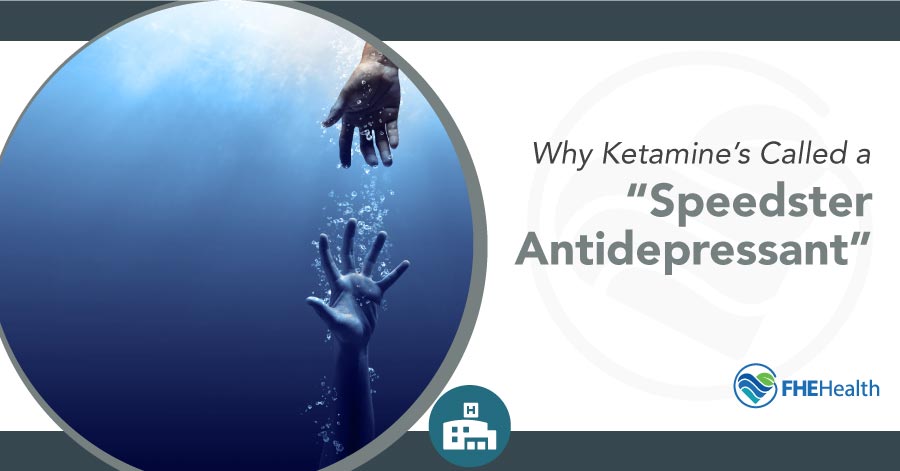
It seems like every day, a new news report pops up describing how medical professionals are using radical new methods to treat issues like anxiety and depression. One recent breakthrough is ketamine as a treatment for various mental health issues. That’s right: The drug that most people associate with raves and major parties is not only a legal medication for depression—it can also be incredibly effective.
Mainstream drugs and treatment options are often slow to kick in. Even the quicker ones can take weeks to months to relieve symptoms. The timeline for ketamine is much faster. Most treatments begin with an infusion that takes less than an hour. This time is different for everyone, but one woman described closing her eyes and just letting the drug work as her mind became “amazingly quiet.” Other people describe meditative discoveries or relaxing hallucinatory experiences like a ride from Willy Wonka.
There can be a bit of an adjustment period after the treatment, but within a day many people notice a change, even if they can’t quite verbalize it. Maybe they have a bit more motivation in the morning, or music feels a little more enjoyable, or maybe that conversation with a chatty neighbor isn’t as painful. Ketamine’s ability to produce meaningful results in just a few hours makes it the fastest working antidepressant available, according to experts.
When Other Antidepressants Don’t Work
Ketamine is typically an option for treatment-resistant depression and when other antidepressants don’t work. For example, some of the most common drugs for depression are selective serotonin reuptake inhibitors (SSRIs). But, only 37 percent of people who use SSRIs experience full remission. Meanwhile, roughly 70 percent of people who receive ketamine as a treatment achieve remission after just a single series of infusions.
All of this information probably sounds appealing, but let’s slow down and understand what ketamine is and how it works before we dive into a revolutionary treatment path.
The History of Ketamine and Medicine
It probably feels strange for many people to visit a doctor for a drug that is still illegal in many contexts. However, long before ketamine became the recreational drug of choice for many clubgoers, it was just an anesthetic.
While ketamine abuse ultimately landed the drug on the controlled substance list, the FDA never removed its approval of it for use in medicine. This allowed modern researchers to discover what had long been considered a possibility: that ketamine could treat depression. Even in just the last few years, the FDA has approved new forms of ketamine for mental health treatments, and researchers are testing a variety of new compounds. The reason it’s growing in popularity is that it often provides fast and effective relief.
How Doctors Use Ketamine
Medical use of ketamine is not at all like taking the drug recreationally. First and foremost, the doses are much lower. Additionally, the method of delivery is very different.
Currently, the most popular treatments involve an intravenous delivery of a saline-ketamine solution. This allows a slow, diluted drip of ketamine to enter the bloodstream for about 30 minutes. Not only is this safer but it also ensures more ketamine is available for the brain. Once the bag is empty, the session is done. Throughout treatment, medical professionals track patient vitals and ensure they are comfortable.
As might be expected from a drug that scientists have sometimes dubbed the “quickest-acting antidepressant,” many people notice effects immediately, although it can take several hours for some individuals to feel a difference. How the changes manifest in individuals can be different. Some people notice that they are finally able to feel positive emotions without feeling inauthentic. Socializing with family and friends becomes genuinely enjoyable and life obstacles feel easier to beat. Boosts in motivation and energy may also occur.
Does It Work For Everyone?
As with any therapy or medication, ketamine doesn’t necessarily work for everyone. Some people have health issues that may interact poorly with ketamine. Ketamine is a dissociative agent, so some patients may experience changes in their perceptions of time or even hallucinate. However, IV delivery of ketamine is generally well-received and medical professionals can identify possible issues during initial consultations. Plus, unlike other medication delivery methods, an IV drop can be stopped mid-treatment if a patient is experiencing any problems.
Finally, though the risk is very low in a clinical setting, there is always the potential for addiction when dealing with substances like ketamine. If this is a concern, a consultation with your doctor may be helpful.
Recreational vs. Medical Use
Some people may wonder why they need to visit a professional to receive treatment when they could just use ketamine at home. However, this is dangerous for a large number of reasons. Should something go wrong during self-treatment, there is no medical professional to intervene and provide care. Additionally, the risk of addiction is far higher for non-clinical drug use. Similarly, the potential for a “bad trip” or entering a “K-hole” is much higher, so that a person is more at risk of experiencing a frightening detachment from reality and auditory and visual hallucinations.
Beyond these issues, recreational use of ketamine has links to amnesia, seizures, and aggressive behavior. Over time, ketamine abuse can even damage major organs, including the digestive tract, urinary tract, liver, kidneys, and brain. Because experts use far lower and more controlled doses of ketamine via a safer delivery system, these issues are extremely rare in clinical settings.
Is Ketamine Right For You?
Around the world, ketamine is becoming an increasingly mainstream approach in treating treatment-resistant depression. People who thought they would never be able to live with a healthy mind again are discovering the joys of a world without depression. Experts typically recommend trying standard antidepressants before receiving infusions of ketamine. However, if traditional medications like SSRIs aren’t helping, ketamine may be the answer. To find out if ketamine infusion therapy is right for you, contact us today and schedule a consultation.






